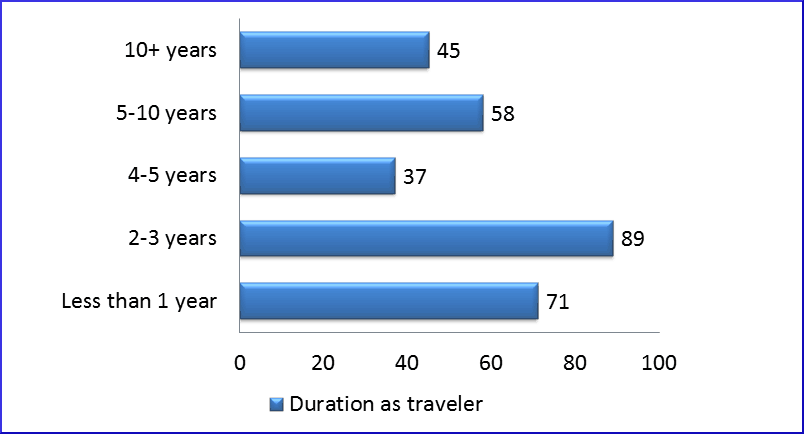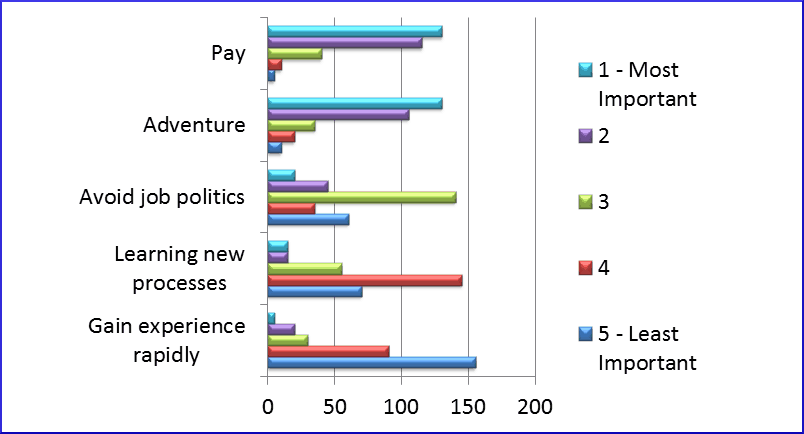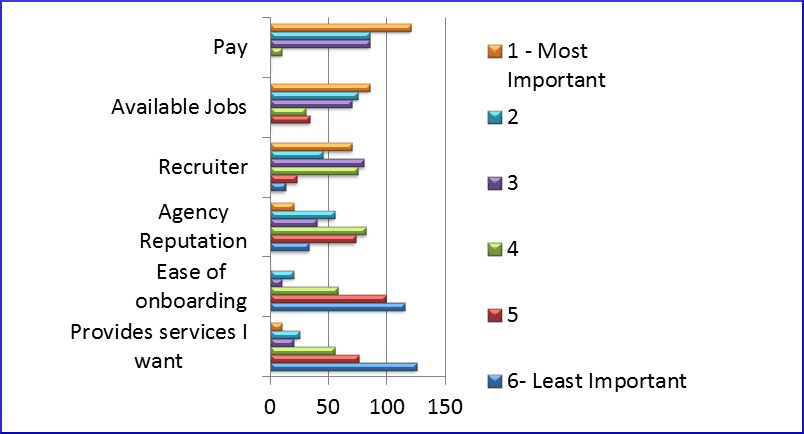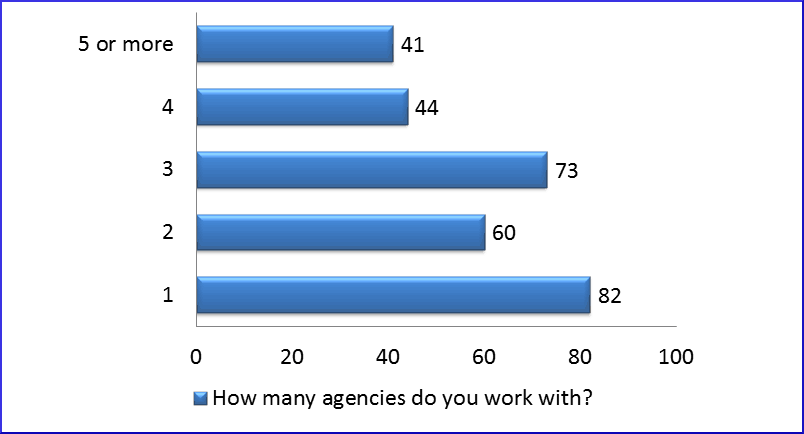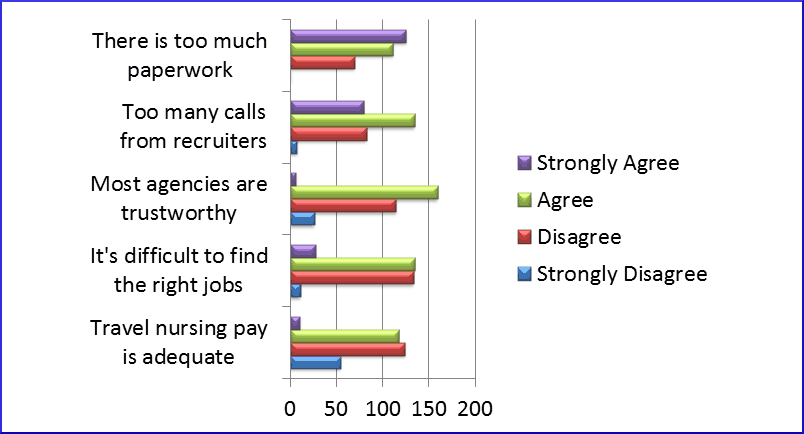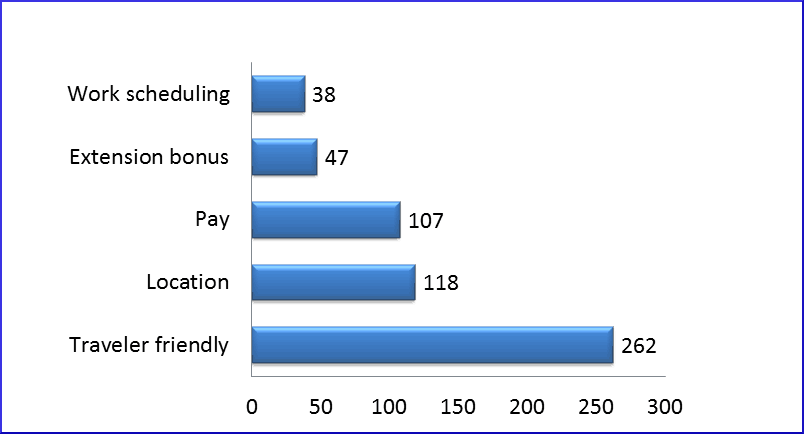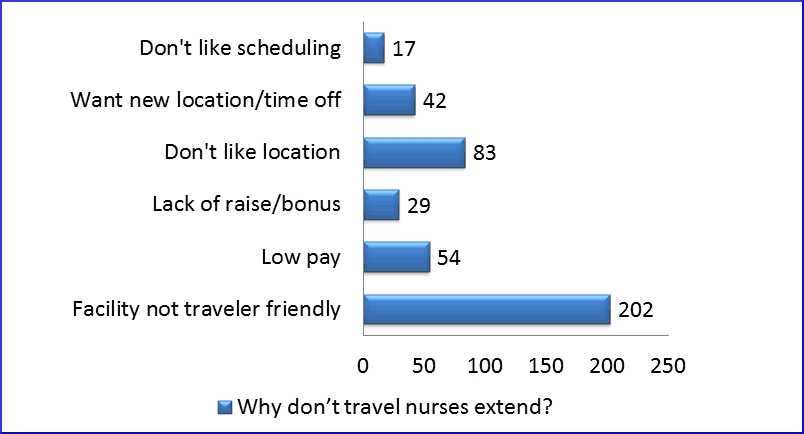Travel Nurse Survey Sends Message to Agencies
BluePipes recently conducted a survey of travel nurses on a wide range of topics including why they’ve chosen to engage in travel nursing, what’s important to them when choosing agencies to work with, and why they choose to extend on travel nursing assignments. The results of the survey include several details that convey actionable opportunities for healthcare staffing agencies interested in improving their recruitment results and retention rates. The results also include some key items for travel nurses to consider regarding the management of their travel nursing careers.
About the travel nursing survey
The survey was conducted between March 22, 2014 and September 22, 2014. We solicited responses from BluePipes travel nursing members, visitors to BluePipes Blog and via various social media channels. We had a total of 300 respondents.
This may seem like a small number of respondents, but in the polling world, it actually represents a very large sample size. National polls like Gallup typically include 1,000 respondents and have a margin of error of + or – 4%. So national polls include approximately 1 in every 200,000 adults in the nation. Considering that there are an estimated 12,000 to 15,000 travel nurses, a sample size of 300 is quite large.
With that in mind, let’s take a look at the poll results and discuss the implications.
How long have you been travel nursing?
As you can see, the majority of respondents, 53%, have been traveling for less than 3 years. The largest segment of respondents, 30%, have been engaged for 2 to 3 years. However, we were surprised by the number of respondents, 47%, who have been traveling for more than 4 years.
We thought that by soliciting respondents from BluePipes Blog visitors we’d get a much larger percentage of newcomers. Over 85% of blog traffic is driven by search, so we believed newcomers were much more likely to come across our content while attempting to learn more about the industry.
In any case, the respondents represent a fairly evenly distributed mix of experience levels. We have no clue how indicative this is of the overall market. However, as you’ll see below, many of the survey responses are overwhelmingly lopsided which indicates that attitudes maybe stable across all groups.
Rank the importance of the following factors in your choice to be a travel nurse:
This question asked travelers to rank the importance of 5 commonly cited benefits of travel nursing in their choice to become travelers. “Pay” and “Adventure” dominated the top 2 spots with 82% and 79% of respondents respectively selecting them as one of their top two reasons. Meanwhile, 47% selected “Avoiding on the Job Politics” as their third most important factor. 49% selected “Learning New Processes and Procedures” as their fourth most important factor. And 52% selected “Potential to Gain More Experience Rapidly” as their fifth most important factor.
Takeaways for Travel Nursing Agencies and Travelers
That 79% of travelers cited Adventure as one of their top two reasons for traveling should be setting off opportunity alarm bells for every agency. What does your agency do to create adventure for its travelers? If you do little to nothing in this regard, then you’re missing a big opportunity.
There are any number of actions that agencies can take to create adventure for their travelers. Send weekly notifications about events occurring in your travelers’ locations. Offer to introduce travelers working for your agency in the same area so they can explore together. Have every one of your recruiters join websites like MeetUp so they can recommend options in the area. Schedule a quarterly “Adventure” with a small group of your travelers. Take pictures, request pictures, and communicate your adventurous company culture via social media so that travelers know you’re the Adventure Company.
The survey also indicates that Pay is equally important for travel nurses. This one is a little more difficult for agencies to contend with but there are opportunities nonetheless. The market is becoming increasingly competitive with the proliferation of Vendor Management Services that allow hospitals to work with as many agencies as they want. Additionally, bill rates for all supplemental healthcare staff have decreased over the past few years. And more money for the traveler means less money for the agency.
However, most industry experts agree that bill rates have bottomed out and the market is slowly beginning to turn. Agencies should be pressing for increased rates. Find orders that have remained unfilled for long periods of time and have your account managers call their contacts and request an increased rate to get the order filled ASAP. This will work in enough cases to make it worth the agency’s time and it will ultimately serve to push rates higher. Agencies can also take steps to make their pay packages more transparent and easier to understand.
Of course, travel nurses can help their own cause with regard to pay. The best way to do that is to work with more agencies in order to increase competition for your services.
Rank the importance of the following factors when choosing a travel nursing agency to work with:
This question asked travelers to rank the importance of several factors when choosing a travel nursing agency to work with. As you can see, “Pay” once again dominates the top of the results. “Available Jobs” is a close second and is closely related to “Adventure” from the question above. “Relationship with Recruiter” and “The Agency’s Reputation/Ratings” were fairly similar, however “Relationship with Recruiter” garnered significantly more top ratings.
Interestingly, “Agency Services like Housing and Benefits” was ranked slightly lower than “Ease of Onboarding.” However, the fact that both of these ranked lower overall may have more to do with the fact they are fairly standard across all agencies. In other words, almost all agencies have the same onboarding process and offer the same primary benefits, so there is really no incentive to rank them higher.
How many agencies do you work with?
This question simply asked how many agencies the respondent worked with. 53% of respondents indicated that they worked with 3 or more agencies. Which means that 47% of respondents worked with only 1 or 2 agencies. Working with 1 agency was the single most popular response.
This is great news for agencies. 47% of their customers are pretty much content to stick with them and not test the waters with other agencies. At the same time, very few of their potential customers (travelers) are creating a competitive market place for their business. It’s fair to say that most competition between agencies is over newcomers and getting their candidates submitted more quickly for open assignments than their competitors. The real competition for agencies is over increasing market share.
The next set of questions will shed some light on why that is.
Rank your level of agreement with the following statements:
This question asked respondents to rank their level of agreement with various statements regarding travel nursing. 79% of respondents agreed that there is too much paperwork in travel nursing. 71% agreed that they get too many calls from recruiters. 55% believe that most agencies are trustworthy. 54% have a difficult time finding the right job at the right time. And only 42% of respondents agree that pay rates are adequate.
Rank your level of agreement with the following statement: I do not like filling out applications and skills checklists

Rank your level of agreement with the following statement: I would be more likely to work with an agency if they didn’t require me to fill out an application and skills checklist at the outset.

Takeaway for agencies and travelers
The previous three questions are laden with takeaways for both agencies and travelers. Agencies would be wise to enhance their efforts at maintaining their public perceptions as trustworthy organizations. It also might be time for agencies to press their client hospitals for increased bill rates at every opportunity. When nearly 60% of your staff believes that they’re not getting adequately compensated, it’s time for a change. Especially when your staff is as highly employable as nurses are.
Perhaps most importantly, agencies can significantly improve their recruitment results by simplifying their submission process for new candidates. Many of the staffing industry’s leading experts agree that forcing highly employable applicants to contend with lengthy application processes is a major hindrance to your recruitment efforts. Paperwork avoidance maybe one of the reasons that so many travelers work with so few agencies.
Instead of requiring a lengthy application process, accept your candidates’ resumes and enter the data into your applicant tracking systems if you must. You can accept skills checklists that candidates have previously completed and saved. Accept a candidate’s BluePipes resume, application and skills checklist for submission. Also, be mindful that many of your competitors are already taking these steps and they’re clearly calling your travelers as indicated by the survey. You can add your agency to our List of Agencies Accepting Bluepipes Documents for free.
Meanwhile, travelers who have difficulty finding the right job at the right time should be working with more agencies. Different agencies have access to different jobs. Working with as many agencies as possible is the best and easiest way to avoid frictional unemployment. Working with multiple agencies is also the best way to ensure that you land the highest paying travel nursing jobs and increase competition for your services. BluePipes makes working with multiple agencies easier than ever before. If for nothing more, it’s a great idea to have your own submission profile ready to go in case an assignment falls through or you find yourself in a bind. It’s the quickest way to get up and running with new agencies of your choice.
Rank the importance of the following factors when considering a travel assignment:
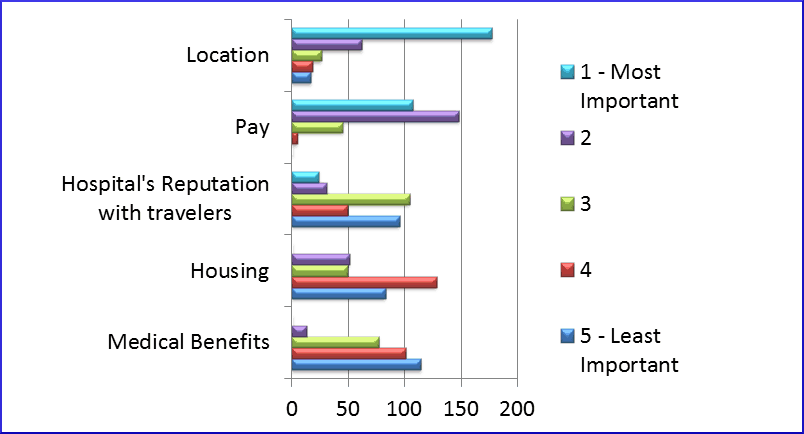
We were surprised to see that 48% of travelers selected “Hospital’s Reputation with Travelers” as one of the least important factors to consider. As you’ll see below, this is the most important factor when considering extensions and we routinely see travelers ask about it in online forums. It may also come as a surprise to see that “Housing” ranked so low for so many with 70% ranking is as one of the two least important factors they consider.
Takeaways for Agencies and Travelers
Most agencies tout themselves as staffing “Nationwide.” However, very few agencies have a major footprint in more than 50% of the major markets throughout the country. Agencies do this because they want the opportunity to see if they may have what the candidate is looking for and also to take a crack at selling the candidate on what the agency has available. This is fine, but agencies may also want to consider the benefits of letting it be known exactly where they do have big footprints so that they can become the agency of choice for those areas.
Here again, travelers should be working with multiple agencies. It’s extremely rare for one agency to have staffing agreements with every employer in a given area. So if location is important, then working with more agencies will only increase your chances of getting to the locations you want.
The last three questions pertained to extensions.
Do you normally extend on assignments?
What factors typically lead you to accept extension offers?
What factors typically lead you to reject extension offers?
As you can see, 67% of travelers indicate that they normally extend on assignments. We also asked all respondents to list the reasons that typically lead them to accept extension offers or reject them. This was a free-form question that provided 6 text boxes for them to type their answers. A whopping 87% indicated that being treated well by the facility’s staff and management was a reason to extend. And roughly 66% indicated that being treated poorly was a reason not to extend.
As expected, whether or not the traveler likes the location also plays a role in the decision to extend. And, perhaps surprisingly for agencies, Pay related issues also play a role in this decision. Agencies may anticipate that if the traveler accepted the pay for the assignment in the first place, then they will be okay with it for the extension. However, many travelers are disappointed by the fact that they are not offered a raise or a bonus.
From the agency’s vantage point, the bill rate for the extension doesn’t change, so if they’ve given the traveler the best deal they can on the first assignment then they have no wiggle room to provide additional compensation for the extension. However, travelers are keen to the idea that it’s less expensive for an agency to staff the extension than it is for them to staff the original contract. The agency has already spent the money and manpower on compliance and credentialing. Moreover, the traveler may not need a travel stipend for their extension contract. So travelers would like to receive a bonus that’s equitable.
Finally, there were some interesting outliers which didn’t make the list because they were mentioned only a few times. For example, several respondents indicated that they do not like it when the have to ask for an extension. This is something agencies should never let happen. Recruiters should always be the ones who ask about extensions.
Several respondents also indicated that strained relations with the agency led them to reject an extension. This is unfortunate. However, travelers should be aware that they can always ask to extend with a different agency or work with a different recruiter at their current agency. Lastly, several travelers mentioned undesirable housing as a reason to decline extension offers. Here again, this is an issue that agencies should be addressing early.
We hope that both agencies and travelers find actionable opportunities within the results of this survey. As always, please post any questions or observations in the comments below.



